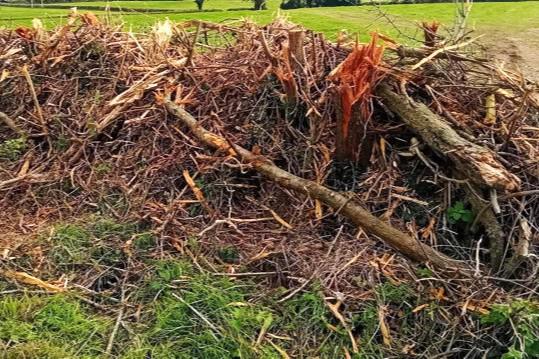Some one million animal and plant species are now threatened with extinction, many within decades, a new report from the Intergovernmental Science-Policy Platform on Biodiversity and Ecosystem Services (IPBES) has found.
The IPBES Global Assessment Report on Biodiversity and Ecosystem Services is the most comprehensive ever completed on the subject. It was compiled by 145 expert authors from 50 countries over the past three years, with inputs from another 310 contributing authors.
The report warns that nature is declining globally at rates unprecedented in human history and the rate of species extinctions is accelerating, with grave impacts on people around the world now likely.
The average abundance of native species in most major land-based habitats has fallen by at least 20%, mostly since 1900, the report found.
Meanwhile, when it comes to farming, it found that more than 9% of all domesticated breeds of mammals used for food and agriculture had become extinct by 2016, with at least 1,000 more breeds still threatened.
It also noted that more than one-third of the world’s land surface and nearly 75% of freshwater resources are now devoted to crop or livestock production.
Five drivers
In order to increase the policy-relevance of the report, the assessment’s authors ranked, for the first time at this scale and based on a thorough analysis of the available evidence, the five direct drivers of change in nature with the largest relative global impacts so far. These drivers are:
1. Changes in land and sea use.2. Direct exploitation of organisms.3. Climate change.4. Pollution.5. Invasive alien species.Chair of IPBES, Sir Robert Watson, said that the overwhelming evidence of the report is that it presents an ominous picture.
“The health of ecosystems on which we and all other species depend is deteriorating more rapidly than ever. We are eroding the very foundations of our economies, livelihoods, food security, health and quality of life worldwide.”
Not too late
Watson also said that the report also tells says that it is not too late to make a difference, but only if we start now at every level from local to global.
“Through transformative change, nature can still be conserved, restored and used sustainably – this is also key to meeting most other global goals.
“By transformative change, we mean a fundamental, system-wide reorganisation across technological, economic and social factors, including paradigms, goals and values.
“The member states of IPBES plenary have now acknowledged that, by its very nature, transformative change can expect opposition from those with interests vested in the status quo, but also that such opposition can be overcome for the broader public good,” Watson said.
Read more
Renewables drive on-farm diversification businesses in the UK
EU's Brazilian imports destroying 300 football fields of forest per day
Efficient farming needs to be part of climate change solution - UFU
Some one million animal and plant species are now threatened with extinction, many within decades, a new report from the Intergovernmental Science-Policy Platform on Biodiversity and Ecosystem Services (IPBES) has found.
The IPBES Global Assessment Report on Biodiversity and Ecosystem Services is the most comprehensive ever completed on the subject. It was compiled by 145 expert authors from 50 countries over the past three years, with inputs from another 310 contributing authors.
The report warns that nature is declining globally at rates unprecedented in human history and the rate of species extinctions is accelerating, with grave impacts on people around the world now likely.
The average abundance of native species in most major land-based habitats has fallen by at least 20%, mostly since 1900, the report found.
Meanwhile, when it comes to farming, it found that more than 9% of all domesticated breeds of mammals used for food and agriculture had become extinct by 2016, with at least 1,000 more breeds still threatened.
It also noted that more than one-third of the world’s land surface and nearly 75% of freshwater resources are now devoted to crop or livestock production.
Five drivers
In order to increase the policy-relevance of the report, the assessment’s authors ranked, for the first time at this scale and based on a thorough analysis of the available evidence, the five direct drivers of change in nature with the largest relative global impacts so far. These drivers are:
1. Changes in land and sea use.2. Direct exploitation of organisms.3. Climate change.4. Pollution.5. Invasive alien species.Chair of IPBES, Sir Robert Watson, said that the overwhelming evidence of the report is that it presents an ominous picture.
“The health of ecosystems on which we and all other species depend is deteriorating more rapidly than ever. We are eroding the very foundations of our economies, livelihoods, food security, health and quality of life worldwide.”
Not too late
Watson also said that the report also tells says that it is not too late to make a difference, but only if we start now at every level from local to global.
“Through transformative change, nature can still be conserved, restored and used sustainably – this is also key to meeting most other global goals.
“By transformative change, we mean a fundamental, system-wide reorganisation across technological, economic and social factors, including paradigms, goals and values.
“The member states of IPBES plenary have now acknowledged that, by its very nature, transformative change can expect opposition from those with interests vested in the status quo, but also that such opposition can be overcome for the broader public good,” Watson said.
Read more
Renewables drive on-farm diversification businesses in the UK
EU's Brazilian imports destroying 300 football fields of forest per day
Efficient farming needs to be part of climate change solution - UFU









SHARING OPTIONS